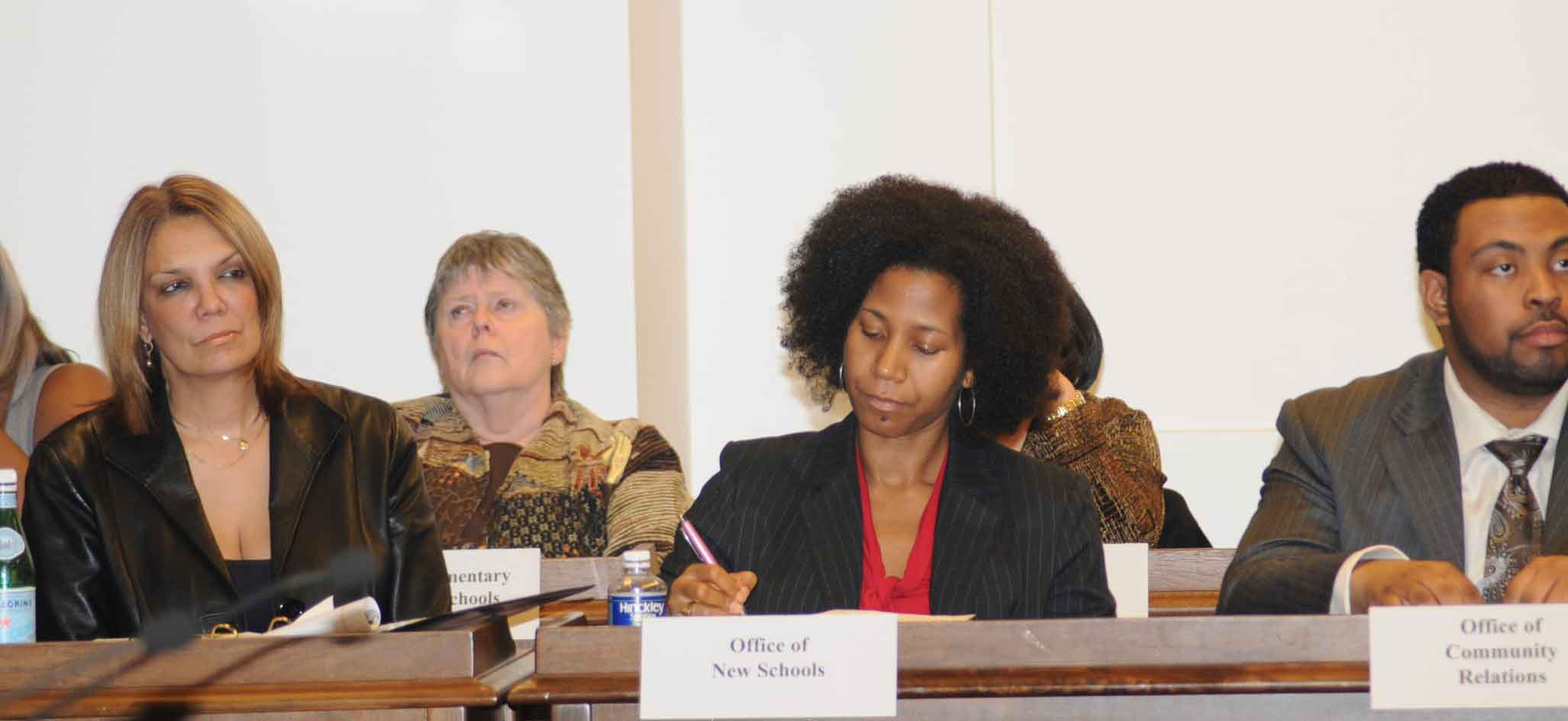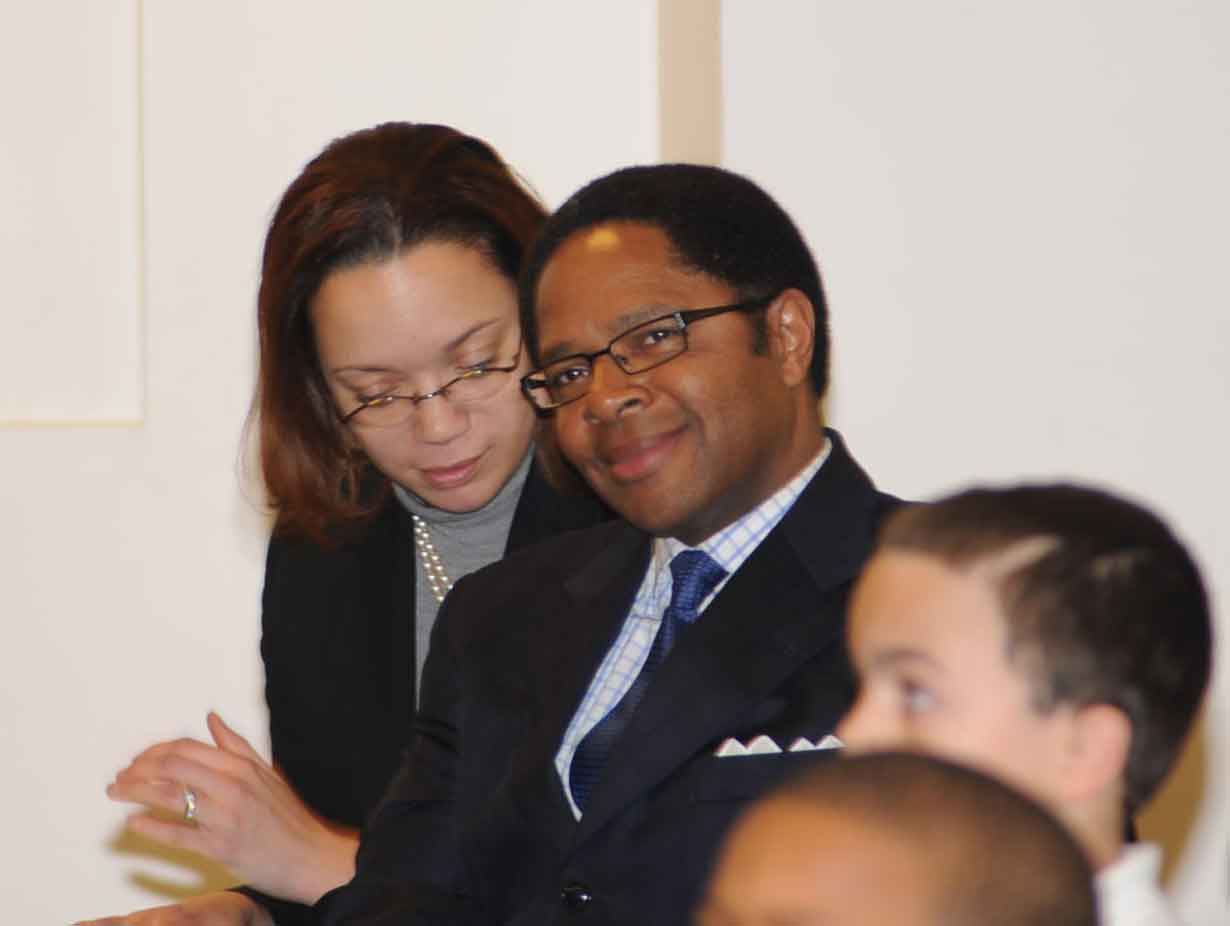Two Chicago Board of Education members hear Holmes Elementary School 'Family' challenge proposal to 'turnaround' Holmes
It was unprecedented. For the first time in history, more than one member of the Chicago Board of Education attended a hearing on the proposal to "turnaround" one of the city's elementary schools.
 Chicago Board of Education member Roxanne Ward (above left) sits with the 'Non-Board' people at the February 9, 2009, hearing on the proposal to 'turnaround' Holmes Elementary School. Ward was attending the first hearing she had ever attended since she began voting to close, phase out, consolidate, "turnaround" (the CPS phrase for reconstitution) and often privatize public schools four years ago. On February 9, Ward chose to sit in the section marked "Office of New Schools." The "Office of New Schools" has been dictating Board of Education policy for the privatization or public schools since shortly after Mayor Daley announced the "Renaissance 2010" plan in 2004. "Renaissance 2010" was drafted by the Civic Committee of the Commercial Club of Chicago in the form of a 2003 report entitled "Left Behind" and became CPS policy the following year. "Left Behind" claimed that Chicago's public schools had failed and should be privatized through the creation of a system of charter schools. Since 2004, Ward has voted in favor of every charter school proposal that has been submitted to the school board. Substance photo by George N. Schmidt. On February 9, 2009, both Board President Rufus Williams and Board member Roxanne Ward listened intently as more than 30 teachers, parents, community leaders, students and other supporters of Oliver Wendell Holmes Elementary School told hearing officer Fred Bates that the school should not be subjected to what CPS has been calling "turnaround" (but which is in reality what the law terms "reconstitution").
Chicago Board of Education member Roxanne Ward (above left) sits with the 'Non-Board' people at the February 9, 2009, hearing on the proposal to 'turnaround' Holmes Elementary School. Ward was attending the first hearing she had ever attended since she began voting to close, phase out, consolidate, "turnaround" (the CPS phrase for reconstitution) and often privatize public schools four years ago. On February 9, Ward chose to sit in the section marked "Office of New Schools." The "Office of New Schools" has been dictating Board of Education policy for the privatization or public schools since shortly after Mayor Daley announced the "Renaissance 2010" plan in 2004. "Renaissance 2010" was drafted by the Civic Committee of the Commercial Club of Chicago in the form of a 2003 report entitled "Left Behind" and became CPS policy the following year. "Left Behind" claimed that Chicago's public schools had failed and should be privatized through the creation of a system of charter schools. Since 2004, Ward has voted in favor of every charter school proposal that has been submitted to the school board. Substance photo by George N. Schmidt. On February 9, 2009, both Board President Rufus Williams and Board member Roxanne Ward listened intently as more than 30 teachers, parents, community leaders, students and other supporters of Oliver Wendell Holmes Elementary School told hearing officer Fred Bates that the school should not be subjected to what CPS has been calling "turnaround" (but which is in reality what the law terms "reconstitution").
The Board sits with the 'Non-Board
'Roxanne Ward sat with members of what observers have been calling the 'Non-Board' from the beginning of the hearing at 4:00 p.m. until the hearing ended a few minutes after 6:00 p.m. The 'Non-Board' is the nickname many people have given to the two dozen or more CPS bureaucrats who are required to sit in the off limits section of the Board chambers on the fifth floor of 125 S. Clark St. during each of the hearings. Many of the parents and other members of the public believed that the people wearing expensive suits in the 'Non-Board' were the actual members of the Board of Education who would be voting on their school's fate at the February 25 meeting of the Chicago Board of Education.
Not so.
 Chicago Board of Education President Rufus Williams (above, center) attended most of the February 9 hearing on the proposal to "turnaround" Holmes Elementary School. Substance photo by George N. Schmidt.The fate of each of the 22 schools proposed this school year for massive changing is in the hands of the Chief Executive Officer of the Chicago Public Schools (Ron Huberman) and the seven members of the Chicago Board of Education.
Chicago Board of Education President Rufus Williams (above, center) attended most of the February 9 hearing on the proposal to "turnaround" Holmes Elementary School. Substance photo by George N. Schmidt.The fate of each of the 22 schools proposed this school year for massive changing is in the hands of the Chief Executive Officer of the Chicago Public Schools (Ron Huberman) and the seven members of the Chicago Board of Education.
Legally, Huberman must propose any action in the form of a "Board Report", but the action does not become legal until it receives a majority vote of the seven-member Board of Education.
The CEO and all seven members of the Board of Education are appointed by Mayor Richard M. Daley under powers granted to him in 1995 with the passage of the Amendatory Act by the Republican Illinois General Assembly and signed by then Governor Jim Edgar, also a Republican. The Amendatory Act ushered in what has become knows as the era of mayoral control in big city school governance.
Passionate pleas
The two Chicago Board of Education members at the hearing received an earful, as more than two dozen teachers, students, parents, and others condemned the proposal to subject Holmes to reconstitution.
Nine students testified, praising their teachers and pointing out that getting rid of veteran teachers and replacing them with new teachers would undermine discipline at the school. Hearing officer Fred Bates has claimed that it is within his power to ban the naming or photographing of students who testify at hearings he is conducting.
Statements on behalf of the school came from many teachers, from the school's principal, from parents and community leaders supporting the school, and from others (including this reporter).
Several speakers noted that the Englewood Community, where Holmes sits, is the most violent in the City of Chicago (and therefore one of the most violent in the USA). These speakers noted that after the gang murder of one Holmes student last year, the teachers and others in the school were able to "come together like family" for the sake of the surviving children at the school. Despite the violence, every teachers from Holmes returned to the school this school year instead of seeking other jobs.
Contrast with nearby 'Turnaround' School
The speakers also noted stark contrasts with nearby Sherman "School of Excellence", which has been under AUSL "turnaround" for two years. Holmes teachers and University of Illinois professor Rico Gutstein noted that the test scores at Holmes are the same as or better than the scores at the Sherman school, which supposedly has improved thanks to AUSL turnaround. Gutstein added details about hundreds of thousands of dollars in additional corporate support that goes to Sherman but not to other schools in the community, like Holmes.
As usual, the hearing officer, attorney Fred Bates, ruled that students who were testifying, many eloquently, could not be photographed without explicit parental permission.
Bates, who has been conducting reconstitution hearings since he heard the "evidence" against Englewood High School in 1997, continues to tell each hearing that he is an "indpendent" hearing officer. Insofar as can be determined, "independent" means that the attorney conducting the hearing is not a direct employee of the Chicago Board of Education.
Bates's report is supposed to be part of the Board of Education's agenda prior to its February 25 meeting. Last year, the only materials the Board members received by the time of their votes (on February 27, 2008) was the hearing officer report. In 2008 (and previous years), Board of Education members neither attended the hearings nor read the thousands of pages of materials that people had painstakingly gathered and placed "into the record" during the hearings. Hearings such as these have been taking place every year since 2004, when Mayor Daley announced the "Renaissance 2010" program.


By: Margaret Wilson
Retired Holmes Teacher
I agree that Holmes should not be included in the turn-around program. The school staff, parents, and students have worked hard to improve student progress and to come together as a family.